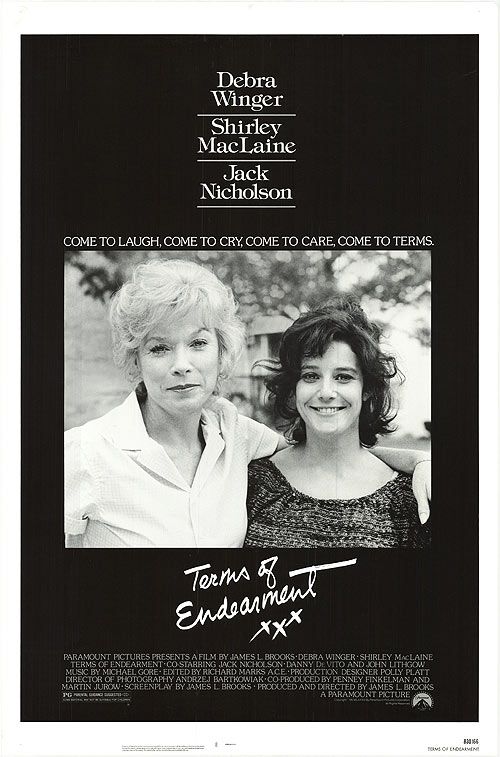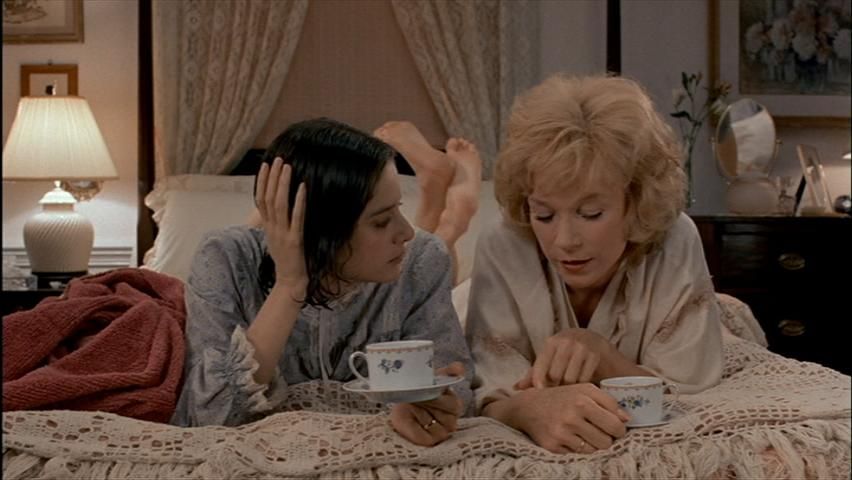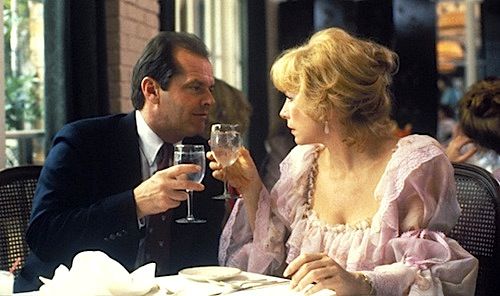Terms
of Endearment
1983
Director: James L. Brooks
Starring: Shirley Maclaine, Debra
Winger, Jeff Daniels, Jack Nicholson
I
don’t think it’s possible to be a consumer of popular culture and not have some
concept of what Terms of Endearment is all about. The driving on the beach scene is the most
famous cinematic moment from the film, but everyone seems to know the basics of
the plot and how it ends. So really, I
shan’t be terribly careful about keeping the ending a secret; I don’t consider
it a spoiler in the least (it certainly wasn’t for me). You have now been warned.
Aurora
Greenway (Maclaine) was widowed as a young mother. Living in Houston in a very nice house, she
is anxious and overprotective of her young daughter Emma (Winger). When Emma grows up, Aurora disapproves of her
husband, Flap Horton (Daniels), a young English professor. Emma and Flap have children and move away, but
Emma and Aurora maintain their relationship through long distance phone calls. Eventually, Aurora starts to take up with the
next door neighbor, ex-astronaut Garrett Breedlove (Nicholson), while Flap and
Emma both engage in extramarital affairs of their own. And then Emma’s doctor discovers a couple of
lumps in Emma’s armpit, and cue the hospital sequences.
The
basic plot outline of “mother-daughter relationship through the years
culminating in untimely death of daughter” sounds exactly like the kind of
melodramatic claptrap I desperately avoid.
But Terms of Endearment manages to transcend its Lifetime:
Television For Women trappings for two reasons.
One: the movie is based on a novel by Larry McMurtry, he whose previous
written work lead to The Last Picture Show, Hud,
and most recently, Brokeback Mountain. Two:
James L. Brooks, he who helped unleash The
Simpsons onto an unwitting populace.
The
way I see it, were it not for these two men (men in a women’s picture!), I
would be writing a much angrier review right now. Both of them supply a very distinct and
necessary counterweight to the saccharine story this film could easily devolve
into.
For
McMurtry’s part, he writes tales that have great and profound emotional
resonance to them, but with a very flinty edge.
He is not scared to thrust the knife in the gut when he must. Consider the cow slaughter sequence in Hud,
and the bit with the tire iron in Brokeback Mountain. While there is no similar violence in this
film, there is a similar dash of cold cruelty every now and then, a fact which
offsets the story just when it was feeling too sweet. Perhaps it is in the way that Emma so
blithely cheats on her husband, or how her oldest son Tommy still pulls away
from her on her deathbed, or how Aurora flatly tells her daughter she won’t be
attending her wedding. These moments,
and their repercussions, help keep the film moving along a solid
trajectory. In a Lifetime Movie of the
Week, the last action in particular would be followed by scene upon scene of
histrionic wailing and arguing. Not so
in Terms
of Endearment. Emma is upset
with her mother, but doesn’t yell. She
just walks out of the room. Although
Aurora misses the wedding, the two are back speaking to one another in a matter
of weeks. This is a very different tone
from what I was expecting.
In
terms of James L. Brooks, he takes these life events and injects a heaping dose
of what has now become his trademark gentle comedy. I don’t think anyone does gentle comedy like
Brooks. As Good As It Gets and Spanglish,
two of his more recent directorial films, had that humor in spades, and I
confess, I really like both of those movies.
Terms of Endearment opens with a shot of baby Emma sleeping in
her crib. Aurora peeks her head in the
room while her husband yells at her from the next room to leave her alone. Aurora, however, is insistent that because
her daughter is sleeping silently, it means her daughter has died, and is not
content until she wakes Emma and Emma starts to cry. At this point, Aurora leaves the room
happy. That scene immediately made me
laugh, while remembering that this, after all, is James L. Brooks. So many of these moments throughout the film
make you laugh or giggle while something life-changing is happening.
Both
Maclaine and Nicholson won Oscars for their roles in this film. Both are very good, but not
career-defining. For his part, this
feels like the first film Nicholson made that was the Nicholson we have today:
that older man with the creepy smile grabbing life by the ping pongs. In 1983, Nicholson was probably playing older
than he actually was, and he gained weight to make himself seem more like a
former superstar gone to promiscuous seed.
At the time, it was probably a new Jack.
Now, it’s lost its novelty; it’s the Jack who keeps making movies like The
Bucket List. Hey, at least this
flick is pretty good.
The
central relationship that drives the film is that of mother and daughter. While not a perfect match, I kept being
reminded of Gilmore Girls (only one
of my favorite TV shows ever).
Especially in the second half of the film, Aurora and Emma talk to one
another more as friends than as mother and daughter, which is probably which I
kept on thinking of Lorelai and Rory (it also didn’t hurt that Gilmore Girls references Terms
of Endearment a couple times). I
liked seeing that. But what confused me
was how the movie, the entry in 1001 Movies, and pretty much every other
review I read of this film talked about how Aurora and Emma have a strained
relationship. I saw no such strain. When Aurora says to Emma that they fight all
the time, Emma is surprised. “That’s
just how you see it.” I can’t help but
agree with Emma on this one. I honestly
do not get how this is a tempestuous relationship. I saw a mother and daughter who clearly love
each other, are very close, and occasionally piss each other off but never for
long. How on earth is that a strained
relationship?
Despite
using too much soft-focus (waaaaaaaaaaaaaay too much soft-focus) and dragging every now and again, there was enough
bite in the story to keep it moving forward without getting bogged down. Sappy clichés can’t quite help from creeping
in every now and then, but the film does its best to beat them back. And although it has certainly aged and dated
itself (really, who hears they have two lumps in their armpits and doesn’t
immediately want to get it checked out for cancer?!?), it’s still a nice little
story. A little predictable and not
exactly challenging, but every movie cannot – and should not – be a surrealist
experiment.
Arbitrary
Rating: 7.5/10.



I freely admit that this is one that I dread. I've almost watched it a couple of times, but it's another one I just can't pull the trigger on.
ReplyDelete@Steve - Be afraid. Be very afraid. (Wait, you like horror movies, so maybe what I wrote was a recommendation for you.)
DeleteWell, Steve, I'll add the flip side to Chip's comment and say that it wasn't nearly as gawdawful as I thought it would be.
DeleteI'm afraid I'm pretty much the opposite of you on almost everything you wrote on the film, the relationship of the mother/daughter, and on Brooks. Sorry.
ReplyDeleteRemember how I mentioned in my Cabaret comments that a movie that has a character I dislike is a movie I usually also end up disliking? Well, I disliked ALL of the main characters in this film, so guess what I felt about the film overall?
Somewhere many years later I figured out that James L. Brooks had also done Broadcast News, which was another film where I disliked all of the characters. After that I tended to be gunshy around his films. Despite the cast, I didn't watch his latest film How Do You Know just because of him.
And as for the mother/daughter relationship, the daughter would have been FAR better off if she could have gotten out from under the yoke of her mother. It was a disastrous relationship for her (the mother being in the hospital with her after she becomes ill does not redeem her in my eyes.)
I guess I've just seen enough of my friends and extended family members deal with situations similar to the mother-daughter relationship in this film, and I've witnessed, first hand, that extricating yourself is nearly impossible and, in the end, unwanted. I have a friend who has a classic love/hate relationship with her mom, but as much grief as she goes through, she can't pull away - nor does she want to. At the end of the day, she loves her mom and her mom loves her - and I kept thinking of her when watching this. You can talk all you want about how the daughter would be better off by cutting off her mom completely, but I respectfully disagree. I think the film is actually more real by creating characters that have differences and disagree but still maintain a bond. Because that's how real life goes.
DeleteHaving said that, I can empirically understand not enjoying Brooks' style. I just happen to like it.
cheap uggs
ReplyDeleteoakley outlet online
michael kors handbags
longchamp outlet
kobe basketball shoes
skechers shoes for men
yeezy sneakers
ugg boots uk
cheap oakley sunglasses
jordan shoes
kobe shoes
ReplyDeletemichael kors handbags
ferragamo belts
coach handbags
vans
yeezy
jordan shoes
yeezy
hermes handbags
nike cortez